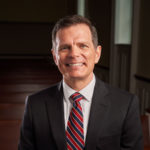
Run Your Own Race
In my pre-parent life, I used to have time to run a few triathlons—sprints, mainly. One of the things that I found personally discouraging was the fact that the race event staff would write your age on your calf muscle with a large waterproof marker. At first, it didn’t bother me—I would be cycling or running and I’d see 56, 72, 40, and a host of other numbers higher than my own as I passed them by. As I progressed in the race, however, I quickly realized that for as many numbers higher than my own that I was passing, there were probably more numbers higher than mine passing me by! I saw one woman with 68 on her calf sail by me like I was standing still. It was a bit humbling to have someone double my age smoke me.Sometimes you have to compare yourselves to others, but the most important benchmark is to ask whether you are being faithful to the tasks that the Lord has set before you. Click To Tweet
I felt a similar sentiment when I was in seminary and later graduate school. There I sat at my desk as my 27th birthday passed me by and I felt like I was standing still. I was still in school, hadn’t done anything significant in my life, and was feeling like many others were passing me. I was sitting in my windowless basement office, single, in a foreign country eating dry cereal for lunch because I couldn’t afford much more. It didn’t help that I knew that John Calvin wrote the first edition of the Institutes by the time he was 27. Here I was, seemingly in neutral, while the world passed me by.
It took some time to figure out that, from one vantage point, I had to ignore what everyone else was doing and run my own race. Sometimes you have to compare yourselves to others, but the most important benchmark is to ask whether you are being faithful to the tasks that the Lord has set before you. Are you running your race well? I regret the fact that I never picked up a theology book until my early twenties, but in the scope of God’s providence, that’s where God placed me. Once he opened my heart and affections to study theology, I didn’t want to squander that opportunity. I can’t change the past but I can decide to make good use of the moment and make wise plans for the future.Run your own race. Pray and seek contentment where the Lord has placed you in his holy providence. Click To Tweet
I guarantee there will be times in your ministry where you will feel as though everyone is passing you by. Your colleague will publish a book, add ten new families to his church in a year, witness to and disciple five new converts, or be appointed to a new important position or church. You might be filled with envy, guilt, remorse, or depression because you don’t see the same results in your own ministry despite your diligent efforts. You look at a stack of rejection letters from a host of publishers, you’ve lost ten families this year, you’ve only seemingly offended unbelievers with your attempts to evangelize them, and you’re feeling like the church wants to run you out on a rail! Run your own race. Pray and seek contentment where the Lord has placed you in his holy providence. Put your nose to the grindstone, work hard, and leave the results up to him. Whether in plenty or in want, seek to praise Christ in all situations, and don’t compare yourself to others. Pray that you’re faithful to what Christ has called you to do. Run your own race.

